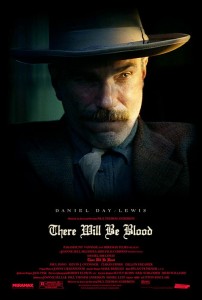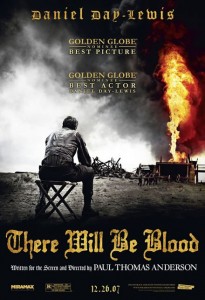#2. There Will Be Blood (2007)
(director: Paul Thomas Anderson; starring Daniel Day-Lewis, Paul Dano and Dillon Freasier)
 The traditional western persona is characterized by independence and self-reliance, a disinterest in social relationships with an introspective silence almost born of an Eastern Zen master, albeit one without as steadfast of a moral compass. Such an individual is by necessity called to the western frontiers, and when the movie’s over and the credits are about to roll, that’s where he must return, riding off into the sunset alone (or occasionally with a new partner so the studio could reinforce a pro-social message). Unfortunately for There Will Be Blood’s central figure Daniel Plainview, he arrived in the west at least twenty years too late, the movie beginning around the turn of the 1900’s. The old laws of the western persona have been replaced with the new ones of a fledgling capitalist system. Thankfully, these laws are accommodating to such a persona, emphasizing the individual gain for those able to distinguish their abilities above the rest of the population, and the first fifteen dialogue-free minutes of There Will Be Blood show Plainview doing just that, simply having swapped the silent, resourceful, independent approach to gun slinging with prospecting. The rules of capitalism also emphasize the competition between individuals, a classical economic device in order to ensure that everyone maximizes the efficiency and quality of their output less they lose their share in the free market to someone else. The only problem with this system is that it’s a purely utilitarian one intent on maximizing output; economists rarely consider the fact that, when everyone is your competitor, you tend to develop a strong dislike for the people around you. But as we know, capitalism is not a completely antisocial system: the masses dislike buying from those that don’t share their moral and religious values which creates a strong incentive to at least appear compassionate and virtuous, and this is where, for Daniel Plainview, the madness truly starts to begin. Torn between a dual identity to at once maintain that independent western persona that allows him to mercilessly succeed in his business over his competitors, while at the same time forced to lower himself to the townspeople’s pathetically banal level whenever he needs their cooperation to sign a deal. The worst of all is the young, evangelist preacher Eli Sunday, whose family owns the land he wants to drill on and insists in involving himself in Plainview’s business while pushing him to join his church (after ‘banishing’ an evil arthritis ghost from an elderly churchgoer, Daniel afterward complements Eli, “That was one goddamn helluva show.”)
The traditional western persona is characterized by independence and self-reliance, a disinterest in social relationships with an introspective silence almost born of an Eastern Zen master, albeit one without as steadfast of a moral compass. Such an individual is by necessity called to the western frontiers, and when the movie’s over and the credits are about to roll, that’s where he must return, riding off into the sunset alone (or occasionally with a new partner so the studio could reinforce a pro-social message). Unfortunately for There Will Be Blood’s central figure Daniel Plainview, he arrived in the west at least twenty years too late, the movie beginning around the turn of the 1900’s. The old laws of the western persona have been replaced with the new ones of a fledgling capitalist system. Thankfully, these laws are accommodating to such a persona, emphasizing the individual gain for those able to distinguish their abilities above the rest of the population, and the first fifteen dialogue-free minutes of There Will Be Blood show Plainview doing just that, simply having swapped the silent, resourceful, independent approach to gun slinging with prospecting. The rules of capitalism also emphasize the competition between individuals, a classical economic device in order to ensure that everyone maximizes the efficiency and quality of their output less they lose their share in the free market to someone else. The only problem with this system is that it’s a purely utilitarian one intent on maximizing output; economists rarely consider the fact that, when everyone is your competitor, you tend to develop a strong dislike for the people around you. But as we know, capitalism is not a completely antisocial system: the masses dislike buying from those that don’t share their moral and religious values which creates a strong incentive to at least appear compassionate and virtuous, and this is where, for Daniel Plainview, the madness truly starts to begin. Torn between a dual identity to at once maintain that independent western persona that allows him to mercilessly succeed in his business over his competitors, while at the same time forced to lower himself to the townspeople’s pathetically banal level whenever he needs their cooperation to sign a deal. The worst of all is the young, evangelist preacher Eli Sunday, whose family owns the land he wants to drill on and insists in involving himself in Plainview’s business while pushing him to join his church (after ‘banishing’ an evil arthritis ghost from an elderly churchgoer, Daniel afterward complements Eli, “That was one goddamn helluva show.”) The film is endlessly rich in texture, the dialogue endlessly quotable while at the same time never being overly stylized or showy. One problem I frequently have with these period films is the awkward balance between preserving historical behavior and mores while modernizing it for 21st century audiences; the former usually results in me being disinterested in the characters whose strictly structured society usually leaves them seeming to have their dialogue, personalities, actions and actions all pre-programmed, the latter usually resulting in Cameron Diaz or Kirsten Dunst putting on a bad wig and accent and playing the same proto-feminist role we see in every other contemporary movie. There Will Be Blood avoids both these pitfalls, at once completely authentic to the way people talk and behaved in the era while never feeling like they have no freewill beyond what the history textbooks dictate they should have. Production values across the board are some of best I’ve seen in a movie this decade, in particular the majestic cinematography by Robert Elswitt and the eerie classical string and piano soundtrack by Jonny Greenwood (of Radiohead fame). While director Paul Thomas Anderson’s previous films (notably Boogie Nights and Magnolia) share a kinship to the ensemble works of Robert Altman, with There Will Be Blood many have suggested that this is the closest to a great Kubrickian epic the world has seen since Eyes Wide Shut. No one else besides Kubrick could be capable of making such a formalized historical drama and having it go on to become a pop-culture phenomenon (“I drink your milkshake” is now probably one of the most memorable movie quotes from the last decade). Perhaps most amazing is the relative youthfulness of director Anderson… even if he takes as long as Kubrick between movies (which he’s on track for so far) there should still be plenty of time for more masterpieces in the decades to come.
The film is endlessly rich in texture, the dialogue endlessly quotable while at the same time never being overly stylized or showy. One problem I frequently have with these period films is the awkward balance between preserving historical behavior and mores while modernizing it for 21st century audiences; the former usually results in me being disinterested in the characters whose strictly structured society usually leaves them seeming to have their dialogue, personalities, actions and actions all pre-programmed, the latter usually resulting in Cameron Diaz or Kirsten Dunst putting on a bad wig and accent and playing the same proto-feminist role we see in every other contemporary movie. There Will Be Blood avoids both these pitfalls, at once completely authentic to the way people talk and behaved in the era while never feeling like they have no freewill beyond what the history textbooks dictate they should have. Production values across the board are some of best I’ve seen in a movie this decade, in particular the majestic cinematography by Robert Elswitt and the eerie classical string and piano soundtrack by Jonny Greenwood (of Radiohead fame). While director Paul Thomas Anderson’s previous films (notably Boogie Nights and Magnolia) share a kinship to the ensemble works of Robert Altman, with There Will Be Blood many have suggested that this is the closest to a great Kubrickian epic the world has seen since Eyes Wide Shut. No one else besides Kubrick could be capable of making such a formalized historical drama and having it go on to become a pop-culture phenomenon (“I drink your milkshake” is now probably one of the most memorable movie quotes from the last decade). Perhaps most amazing is the relative youthfulness of director Anderson… even if he takes as long as Kubrick between movies (which he’s on track for so far) there should still be plenty of time for more masterpieces in the decades to come.
Comments